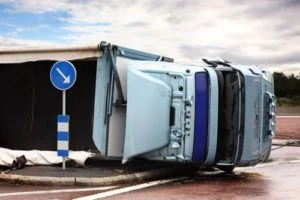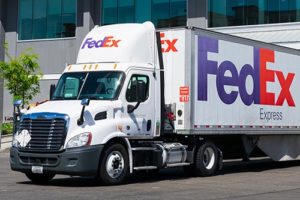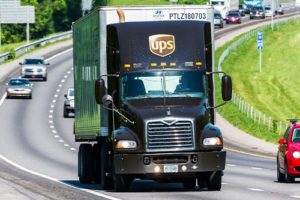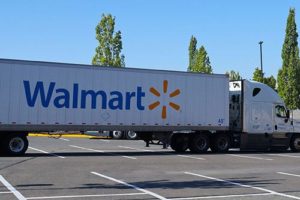
It is any driver’s nightmare to get in an accident with a commercial truck. The huge size and weight of the truck can easily lead to catastrophic injuries and fatalities. On top of that, claiming compensation for damages can be extremely difficult for injured victims and bereaved families.
Unfortunately, large-truck accidents in the USA have been rising in the past decade. In particular, a spike in delivery truck crashes has been reported since the start of the COVID-19 pandemic, due in large part to the dramatic increase in e-commerce purchases from consumers staying at home. Retail corporations and freight companies are also pushing their fleet to fulfill express services such as same-day or next-day delivery.
For ordinary motorists, this could mean a greater risk of getting hurt in a truck accident. It’s important to be aware of your compensation rights in the event of a serious injury, and what to expect from the at-fault party.
Here we will cover truck accidents involving delivery companies like FedEx, UPS, Amazon, and others.
What Happens When a Delivery Truck Crashes in Ohio or Elsewhere in the USA?
 Commercial truck accidents are much more complex than regular car collisions. One major difference is that large companies are involved in delivery truck crashes. You likely won’t just be dealing with the truck driver, but also with the cargo company, their insurance carrier, and sometimes even a third-party firm.
Commercial truck accidents are much more complex than regular car collisions. One major difference is that large companies are involved in delivery truck crashes. You likely won’t just be dealing with the truck driver, but also with the cargo company, their insurance carrier, and sometimes even a third-party firm.
Here’s a typical scenario soon after your truck collision: A large insurance company may call you, often within a day of the accident. You may be speaking with an insurance claims adjuster or representative who will ask you for details about the crash. They may try to get a recorded statement from you, which would later be used to damage your claim. Always refrain from giving any statements until you have consulted a truck accident lawyer.
Meanwhile, the delivery company’s investigators may be quick to start gathering evidence. They will know exactly what to look for and where, be it the truck’s “black box” data, maintenance records, or the trucker’s hours-of-service (HOS) log.
Their early and experienced investigation works to their advantage, especially in states like Ohio where fault can be ‘shared’ among multiple parties. This means that even the injured party can have a share of liability, too.
Under Ohio’s “modified comparative fault” principle, the amount of compensation could be reduced according to how much you were at fault in the accident. For instance, if you were found to be 10 percent at fault, your award could be reduced by 10 percent. Further, if your degree of fault exceeds 50 percent, you may not receive compensation at all.
The comparative negligence rule is often used by insurers to minimize the amount they have to pay.
If you’re struggling with this issue, obtain the counsel of an experienced accident attorney. They will investigate the truck accident, determine liability, and work hard to get you the maximum amount of compensation you are entitled to.
Liability Insurance Coverage in Delivery Truck Accidents
Retail corporations and logistics companies have liability insurance, which should ideally cover your damages in the case of negligence and injury. However, you may find that making an insurance claim against these companies is not straightforward. Here’s a look at some delivery companies’ liability policies, and how they handle carrier truck accidents.
Amazon Truck Accident Insurance Coverage & Bodily Injury Claims

As of 2019, Amazon’s delivery network is shipping about 2.5 billion US packages per year and is poised to overtake FedEx and UPS by 2022.
Under the Amazon Flex program, private individuals may use their vehicles to do Amazon delivery tasks, which are tracked through a mobile app (similar to the Uber or Lyft model).
One issue with this model is that the delivery drivers are not Amazon employees but independent contractors. When a delivery driver gets in an accident, Amazon can say that the company is not legally responsible for the contractor’s actions. The same applies to delivery trucks, which Amazon does not own but outsource from third-party companies.
Amazon does offer Flex Insurance for its contractual delivery drivers, with the following coverage:
- Auto liability coverage – up to $1 million per accident that the driver is at fault for, covering the other party’s bodily injury and property damage
- Uninsured/underinsured coverage – up to $1 million per accident if the other driver is at fault but is uninsured/underinsured
- Contingent and comprehensive collision coverage – up to $50,000 per accident to cover the Amazon driver’s property damage. This is only activated if the driver has comprehensive collision coverage on their personal auto insurance.
Note that these insurance policies apply only when the driver is “on the clock” or official duty with Amazon. During off-duty periods, the driver will have to rely on their auto insurance.
There is a chance that being an Amazon driver could void that personal auto insurance. Some personal policies have a clause that says you cannot use your vehicle for hire.
When a driver’s auto policy is voided due to their job with Amazon, the driver could lose Amazon’s insurance coverage as well. And when that driver gets into an accident, injured parties will be caught in a limbo of canceled coverage, and they’ll find it difficult to sue Amazon due to the contractual arrangement.
In terms of cargo trucks outsourced from logistics companies, Amazon has expressly included in their agreement that those “service delivery partners” have to assume liability for property damage, bodily injury, and death.
The retail giant firmly enforces this agreement. In one example in New Jersey, the contracted logistics business failed to pay the legal bills from an injurious crash. Amazon didn’t pick up the tab but instead sued the contractor’s insurer to force it to pay.
With these legal protections in place, Amazon is capable of denying liability for truck accident damages, leaving victims with little chance of getting fully compensated.
DHL Truck Accident Insurance Coverage & Bodily Injury Claims

In the US, DHL is considered to be a leader in contract logistics, which means that most of its last-mile trucks are outsourced from other businesses and their drivers are not their employees. If you get in an accident with a truck bearing the DHL logo, there’s a good chance that that truck isn’t owned by DHL or driven by a DHL employee. Hence, the multinational corporation can avoid responsibility for injuries and other damages.
One noted example was a truck wreck in New York that resulted in the wrongful death of a woman named Claudia Carlson. The truck that hit her car had the DHL logo painted on it, but it was owned by a company called MVP Delivery and Logistics. The driver was also MVP’s employee, not DHL’s.
Originally, the victim’s surviving spouse was awarded $20 million by the jury, but DHL fought to set aside the verdict, insisting that it was not responsible for the conduct of its independent contractor. To the dismay of the Carlson family, the Appellate Division sided with this argument and dismissed the complaint. The family eventually found victory at the Court of Appeals, but not before going through years of legal battle versus the corporation and their insurer.
FedEx Truck Accident Insurance Coverage & Bodily Injury Claims

In case FedEx Corporation is found liable in a delivery accident, its employee vehicles are covered by a liability policy with a combined single limit of $5 million. “Combined single limit” means it includes any combination of property damage or bodily injury in an accident.
However, not all FedEx drivers are acknowledged by the company as employees. The company has two divisions, among several others, called FedEx Ground and FedEx Home Delivery. These are contracting divisions where delivery drivers are trained and then sign an agreement as Independent Service Providers. Like other firms’ contractual models, this arrangement allows FedEx to distance itself in the event of accidents involving those drivers.
FedEx is continually being accused of misclassifying those drivers as contractors when they could be considered employees under the law. This has been the subject of multiple lawsuits against the logistics corp, spanning the legal fields of personal injury and workers’ compensation.
As of the moment, the contractor agreements are still being used in the FedEx Ground and FedEx Home Delivery divisions. The corporation has used these agreements to deny responsibility in accidents.
In one tragic California crash, multiple people including a toddler were killed after a FedEx Ground truck collided with a family passenger car. The truck was owned by a contracted company, which was later found to be operating without authority from the Federal Motor Carrier Safety Administration (FMCSA). The driver also did not have a valid license to operate either a car or a truck.
Despite these extremely negligent qualities of its contractor, FedEx insisted it had nothing to do with the accident, and that those “third-party vendors” were responsible for their operations. The surviving family of the victims ended up not suing FedEx at all after learning that the corporation was shielded by this business model.
UPS Truck Accident Insurance Coverage & Bodily Injury Claims

Unlike several other shippers, UPS directly employs its truckers instead of contracting them from other companies. If one of those truckers gets in an accident, UPS itself may also be held liable through the legal concept of “vicarious liability” or respondeat superior in Latin, which holds an employer responsible for their workers’ conduct. Each UPS vehicle is covered by a combined single-limit insurance policy of up to $1 million.
However, it’s rarely easy to claim maximum compensation after a UPS truck accident. The company is prepared to fight claims with their highly experienced insurance representatives plus a large legal defense team if a lawsuit ensues.
Walmart Truck Accident Insurance Coverage & Bodily Injury Claims

Being a relatively new program, not much is known about Spark’s accident insurance at the moment. However, the firm that manages the program, called Delivery Drivers Inc., offers on-the-job insurance to its drivers, amounting to $250,000 a year.
Walmart’s trucks are self-insured, meaning the company pays claims ‘out-of-pocket’ up to a certain (undisclosed) limit. If an accident claim exceeds this limit, the company has to reach into their “excess coverage” policy that’s provided by another insurer.
Whether the delivery truck is contracted or owned by Walmart, an accident victim can expect to find an incredibly confusing legal maze when trying to claim damages. The independent contractor arrangement allows Walmart to deny responsibility for the trucker’s accident. Meanwhile, the self-insured and excess policies for Walmart’s trucks can cause major delays and deadlocks in the claim.
The 2014 accident of comedian Tracy Morgan illustrated this. Morgan and several other entertainers were in a limo when a Walmart delivery truck crashed into them. One person in Morgan’s party died while several others were seriously injured, including Morgan himself who went into a coma after sustaining a traumatic brain injury, broken ribs, and a fractured leg.
During the investigation, it was found that the Walmart driver had been awake for over 28 hours, 12 of which were spent driving to the retail facility right before his 14-hour shift. Federal officials found that driver fatigue was a contributor to the accident.
Though Walmart seemed directly liable for its employee’s negligence (under the vicarious liability theory), it took nearly a year before the company settled the case for a reported $90 million. In the aftermath, Walmart sued its excess insurance carriers, alleging that they were holding up the settlement via bad faith insurance tactics.
No doubt that in this case, the involvement of a high-profile personality plus a tragic wrongful death played a part in Walmart’s decision to settle high. But even that kind of spotlight could not swiftly cut through the legal jumble of multiple excess insurers and corporate insurance policies. Imagine what this jumble is like for the many other non-celebrity victims who were injured or bereaved in a Walmart truck accident.
Which Delivery Companies Have the Most Accidents?
The Federal Motor Carrier Safety Administration (FMCSA) is a national agency that regulates commercial transport such as carrier trucks. As part of its record-keeping, it collects inspection summaries and accident reports of American companies with carrier services. Here are some company snapshots from the FMCSA’s Safety and Fitness Electronic Records System, as of April 11, 2021.
- Amazon Logistics Inc. – Headquartered in Seattle, WA
- 19 injury crashes in the last 24 months
- FedEx Express – Headquartered in Memphis, TN
- 143 injury crashes and 6 fatal crashes in the last 24 months
- UPS – Headquartered in Atlanta, GA
- 958 injury crashes and 57 fatal crashes in the last 24 months
- Walmart – Headquartered in Bentonville, AR
- 12 injury crashes and 1 fatal crash in the last 24 months.
Who is Responsible for a Delivery Truck Accident?
Multiple parties can be found negligent in a carrier truck crash. In regular car accidents, it’s usually clear that an irresponsible driver is liable for causing the collision. But in trucking, the driver is just one of the several parties whose task is to ensure on-the-road safety. These include the trucking company, the cargo handlers, and sometimes even truck part manufacturers and service facilities.
When any of these parties fail their duty of care, they may be held liable for the crash.
Truck safety starts with the trucking company itself. Their responsibilities include:
- Ensuring that they hire drivers who meet trucking qualifications
- Providing truck driving training to employees
- Equipping their trucks with industry-standard safety systems (e.g. mirror systems, signal lights, conspicuity tape, etc)
- Regularly inspecting and maintaining the safety of their vehicles
- Loading and securing cargo according to industry standards
- Ensuring that truckers’ shifts comply with federal and state hours-of-service rules, including rest breaks
- Keeping proper records of truck driver work logs, inspection data, and accident reports
- Removing from duty any driver who has displayed problematic road behavior, or any vehicle that does not satisfy inspection standards.
It is quite common to find that a trucking company involved in an accident has had violations of trucking safety rules. Such a violation can greatly support your claim that the company shares some responsibility for your accident.
In many cases, even if the company itself had no safety violations, they may be held responsible for an accident caused by their driver. This is because of the legal doctrine called “vicarious liability” or respondeat superior (“let the master answer”), which holds employers responsible for the conduct of their on-duty employees.
With delivery trucks, however, it’s not always clear which company is answerable. As we’ve seen in the examples above, so many retailers and carrier companies outsource their deliveries to contractors. Even trucks that display a certain corporation’s logo can later turn out to be owned by a separate business.
This causes major complications in an accident claim. You’re left wondering, who should pay for my truck accident injuries? Whose insurance company should I file against?
The wise thing to do is to get the help of an experienced truck accident lawyer. A competent attorney should know how to investigate your crash, identify all liable parties, and skillfully assert your compensation claim.
We Will Be
There To Help
You All The Way
What if The Delivery Truck is Government-Owned?

Unfortunately, this public service agency gets involved in tens of thousands of crashes each year. USPS data shows that in 2020 alone, Postal Service employees were in 26,000+ crashes, and more than half of those involved less-experienced USPS drivers.
What do you do if you are hurt in a USPS truck accident? Because this involves a federal government entity, the typical state rules on accident claims do not apply. Instead, you will have to file your claim under the Federal Torts Claims Act (FTCA).
Like in a personal injury claim, you will need to establish that the USPS or their employee acted negligently, which directly led to your injuries. You’ll also need to show the specific dollar amount of your damages.
However, the process is different from that of an insurance claim. You (and your lawyer) will be working directly with USPS in negotiating your compensation. They have six months to decide whether or not your claim will be “admitted,” and they will also decide whether you get the full requested amount or just a fraction of it. Receiving the full amount is rare but not impossible.
If your compensation claim is not admitted at all, you may have to sue the agency in federal court to obtain what you deserve.
The entire procedure needs to strictly follow the rules of the FTCA, and this usually gets complicated and daunting for claimants. You should get the help of an experienced lawyer to ensure that you satisfy all FTCA requirements and make a strong case.
Settlements and Verdicts in Delivery Truck Accidents
How much is a delivery truck accident settlement worth? The answer to this varies widely, depending on many factors in each accident.
Here are some examples of successful delivery truck accident cases.
$9 million+ Verdict in DHL Crash
In December 2019, an Oregon jury awarded over $9 million to a couple who were struck by a DHL truck operating under the company name Exel Inc. The couple, Eric Moutal and Andrea Newman were bicycling on a bike lane when the 18-wheeler semi-truck veered into their lane. Both cyclists were injured, with Moutal requiring five surgeries after nearly losing his leg.
The jury verdict included $1.26 million for economic damages (like medical bills), $4 million for non-economic damages (like pain and suffering), and $4 million for punitive damages (to punish the at-fault party).
In 2020, DHL tried to lower this award significantly by citing previous cases where the Oregon Supreme Court put a cap on non-economic damages. Specifically, DHL wanted the non-economic damages reduced from $4 million to just $500,000. However, the judge rejected DHL’s effort, siding instead with the “grievously injured” plaintiffs.
$165 Million+ Verdict in FedEx Wrongful Death Case
In 2018, the New Mexico Appeals Court reaffirmed the biggest civil award in state history: a $165.5-million verdict in a FedEx collision case. The crash involved a passenger pickup truck that was rear-ended by a tractor-trailer contracted by FedEx. Two pickup occupants and the driver of the FedEx rig were killed, while a one-year-old child in the pickup survived with serious injuries.
FedEx pushed several efforts to decrease the jury decision, but the Appeals Court rejected the argument. A lawyer for the victims also asserted that this case exposed the company’s outsourcing practice, noting that some contracted drivers don’t have adequate safety training.
$2 Million Settlement in Double-Parked UPS Crash Case
In 2019, New Jersey motorist Paul Cuff received $2 million as a settlement for his injuries partially caused by a double-parked UPS truck. Cuff sustained brain and spinal injuries after colliding head-on with another car.
In his claim, Cuff asserted that he had to cross the center lane because he was steering around a double-parked UPS truck that was blocking the traffic. He and his lawyers requested data on prior accidents involving double-parked UPS trucks, alleging that the company had a practice of paying tickets for their double-parking vehicles. UPS, however, did not provide this data.
$1.5 Million Award in USPS Driveway Crash
This Georgia accident occurred when a car driver was approaching a driveway where a USPS delivery truck was stopped. According to the car driver, she observed that the truck “had been sitting” there for some time, so she assumed that the postal driver was waiting for her to pass. As she moved forward, the truck suddenly pulled out of the driveway, leading to the crash that caused her permanent leg injuries.
The car driver sued the federal government, and the judge eventually awarded her $1.5 million.
Although these publicized cases had multi-million-dollar outcomes, note that this isn’t always the case. Each truck accident claim is unique. The majority of such cases settle at five or six figures, but yours can have a vastly different result. The best way to know how much your claim is worth is to discuss it with a truck accident lawyer.
Why an Experienced Lawyer is Crucial in a Truck Crash
Whether you are a car driver, passenger, or truck driver hurt in a delivery vehicle accident, you’ll want to have a competent and experienced truck accident attorney on your side.
In the case studies above, we see the unique aspects that make a commercial truck accident much more complex than regular car crashes. Powerful companies are involved. The investigation is specialized. Additional rules and regulations apply.
It takes specific training and real-world experience to effectively handle truck injury claims. A qualified lawyer should:
- Be intimately familiar with state and federal laws on commercial trucking
- Have experience in how truck companies and insurance carriers deal with accident claimants — what their tactics are and how to fight them
- Thoroughly examine the accident using evidence such as “black box” data, truck maintenance records, driver credentials, trucking company’s prior accident records, hours-of-service (HOS) logs, and many more
- Determine the full extent of your damages, including present and future expenses
- Be strategic and fearless in asserting your proper compensation, even when faced with big corporations on the other side.
Because of these field-specific considerations, you don’t want to waste your time and money with an attorney who is not familiar with truck injury cases. Choose someone who has demonstrated their effectiveness in handling cases similar to yours.
Reach out to your attorney as soon as possible, because truck accident cases have a Statute of Limitations or a deadline for filing a lawsuit. In Ohio, the statute of limitations for truck injuries is generally two years, but any delay could damage your claim.
Contact Us for Help with Your Truck Accident Case
With over 30 years of experience in Ohio accident cases, The Fitch Law Firm has become a highly trusted ally of truck wreck victims and their families. We know Ohio personal injury law inside and out, and we have stood up to influential companies and insurers. This is why we have obtained several millions of dollars in truck accident settlements and verdicts on behalf of our clients.
You won’t have to pay us unless and until we obtain your compensation for you. Consult with us for free by calling our 24/7 toll-free hotline at (614) 545-3930.
